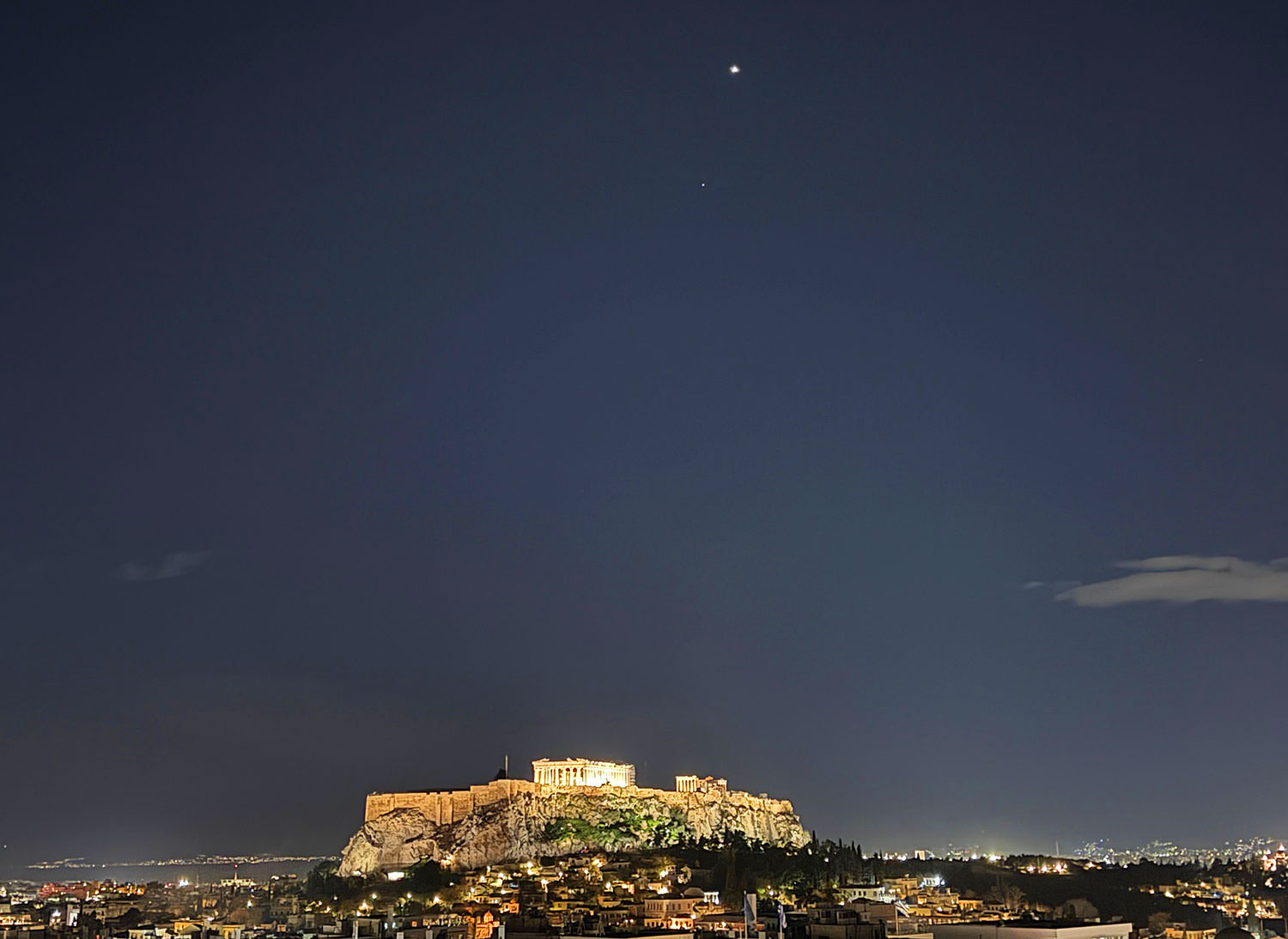I listened to the 45th and now current President’s inaugural address from Brooklyn, not far from his birthplace. A few days later I compose these reflections on Trump’s talk about the future of American democracy sitting in the center of Athens, democracy’s ancient birthplace.
The Athenian statesman Cleisthenes is often credited with setting the city-state on its pioneering path of democratic governance in the 6th century BC. Popular participation was limited in this early avatar of democracy, but this was where the novel idea of self-government, in all its varieties, got its Promethean start.
Some themes in Trump’s short address are a reminder of why both classical thinkers and the founders of the American Republic saw potential tension between the popular will of voters and the demands of a virtuous republic and the rule of law. Elections were understood to be a necessary but not sufficient condition for good governance. Mob rule and plebiscitary excesses were among the concerns. Indeed, this is why Aristotle cautioned that “republics decline into democracies, and democracies degenerate into despotisms.”
It has been widely noted that right after the formal speech Trump gave a second off-the-cuff talk in the Capitol’s Emancipation Hall in which he unleashed candid sentiments about his mega-MAGA victory over political rivals from both parties.
But the form and content of the main speech still provided some important clues about presidential intentions and our nation’s future. Let me mention a few.
FIRST, Trump’s oral delivery was fluid — another reminder of how incoherent Biden had become — but also subdued, almost as though he was on quaaludes. He seemed more than a tad bored by the formal proceedings in the Capitol Rotunda — an obligatory inconvenience, but also an opportunity to send an official, partly coded message to the polity about the big changes ahead.
Trump did seem to relish the rapidly evaporating presence of his democratically defeated predecessor as well as other dejected Democratic Party leaders. As a group they looked worn out, irritated and marginalized — and perhaps expecting to be vindicated one day for having vociferously warned American voters about the grave dangers to the republic of this outcome at the ballot box. “We told you so” could almost be read on their facial expressions as Trump spoke and seized the reins of power.
Even in his subdued mode, Trump’s oratory is deceptively effective in reaching target audiences. Despite teleprompters, the execution is often ungrammatical and syntactically unorthodox, and the thought process zigs and zags, leading smug elite commentators to conclude Trump is not that serious or not that smart.
But the dyslexic bobbing and weaving style conceals a clever communicator who instinctively knows how to meet his intended audiences on their wavelength and, now at last, to make a narrow majority of them feel comfortable with the message.
As Marshall McLuhan so sharply observed of communications culture, “the medium is the message.” Boosted by the tsunami effects of digital communication, Trump in his way understands the new medium — the disruptive power of viral demagogy over the traditional and well-intentioned pedagogy practiced by the centrist liberals and institutionalists he had routed to get back into office.
For success in future elections, whether Trump is around or not, the latter group, while sticking to their traditional civic virtues, will need to better master the digital communications tools of the new politics. Trump has shown how quickly perceptions can change thanks to social media, and this is a two-edged sword that can be effectively wielded by his critics and political opponents.
SECOND, Trump made clear that, thanks to him and to God’s will, we are entering a new national Golden Age. True to his MAGA political brand, Trump peppered the talk with a series of familiar gallumphing memes about American greatness, past and future. Put simply, our country has “a glorious destiny” and is about to be “far more exceptional than ever before.”
Yascha Mounk has aptly described this type of “far more exceptional” rhetoric as “aspirational populism.” If JFK pointed our aspirational way to the Moon, Trump has set our sights on Mars – which presumably could share the rebranding fate of the Gulf of Mexico and be renamed Planet Musk by Executive Order.
Trump’s populism is deeply tinged with unabashed nationalist pride, jingoism, and ethnic chauvinism. Thus, the official U.S. line, which once strived to present American national interests as aligned with international cooperation and interdependence, has given up the ghost of the global commons in favor of the doctrine of America First. In short, we will “not allow ourselves to be taken advantage of any longer.” That message resonates with many segments of society that feel they have received the short end of the globalization stick.
How soon, and at what cost, we will re-discover that all that glitters is not golden are open questions. But liberals should also be prepared for the possibility that Trump will succeed in delivering popular results in various policy areas.
THIRD, in tandem with the viral-blitz communications style, speed of decision-making and policy change was an important theme of the speech. Trump promised to act “immediately” to implement his “revolution of common sense.”
January 20 would be remembered as Liberation Day and things “will change very quickly.” My co-author and I highlighted some these leadership style attributes in our Dancing in the Dark articles in these pages. The “series of historic executive orders” and declarations of national emergencies Trump issued within hours of taking office were indicative of what’s ahead. Referring to his inherent executive commander-in-chief powers as president, Trump said “we will do it at a level that nobody has ever seen before.”
It was instructive that among the few sitting foreign leaders to attend, Italy’s formidable new age populist Georgia Meloni and Argentina’s chainsaw-wielding Milei were prominent. Milei is particularly beloved as a model by MAGA internationalists. Using cut-the-crap leadership playbook, Milei has made some impressive early strides reforming Argentina’s fiscally bankrupt and corrupt corporatist state.
Trump implies that the US similarly suffers from a “radical and corrupt establishment that has extracted power and wealth from our citizens” and suggests that the state needs shock therapy. This is an odd claim and might have more purchase in the chronically low growth, over-regulated EU. The notion that the dynamic and versatile US economy is shackled, in decline and not thriving does not quite square. But judging by the growing inequalities of income and living standards, it’s undoubtedly true that somebody is extracting wealth and power from the American people. Trump may have identified a real problem without fingering the real culprit.
Impatience to deliver results is a political virtue. But speed kills, and revolutionary policy chainsaws are not suited to the evolutionary give-and-take of legislative compromise. Well-functioning democracies need speed limits.
FOURTH, Trump’s promised paradigm shift — “the revolution of common sense” — concerns both substance (policy objectives) and methods (the procedural rules of the game).
The latter line of attack is a direct challenge to the checks-and-balances operating system of the Republic in favor of “decisionism,” an authoritarian political philosophy more commonly and ominously known as “getting the trains to run on time.” Hence the rapid-fire declarations of national security emergencies that supposedly justify executive action.
It is important to keep in mind that Trump’s ukase philosophy is building on previous bipartisan presidential practices of declaring national emergencies and issuing executive orders based on powers delegated or otherwise permitted under the Constitution
The fact that Trump won over a plurality of American voters while being transparent about these ambitions is not trivial. It’s probably true that in democracies, the people who vote and don’t vote alike get the leaders they wish and deserve.
The old paradigm that is the target of Trump’s movement — “our cause” — is the legacy of FDR’s New Deal. The administrative state that rose from that period is particularly reviled by the hyper-libertarian technological elite, who tend to see all regulation as an unacceptable abridgement of their freedom and an encroachment on their brilliance. These are among the advisers who convinced Trump to create a “department of government efficiency” or DOGE.
Four score and seven years before Trump’s second inauguration, on January 20, 1937, FDR delivered his own second inaugural address. Like Trump, Roosevelt was impatient for results. FDR said “we dedicated ourselves to the fulfillment of a vision — to speed the time when there would be for all the people that security and peace essential to the pursuit of happiness.”
Like Trump, FDR saw a great nation before him in need of change, but he had a sharply different idea of what kind of change was needed. FDR stood for the proposition “that democratic government has innate capacity to protect its people against disasters once considered inevitable, to solve problems once considered unsolvable.” He added, “in this we Americans were discovering no wholly new truth; we were writing a new chapter in our book of self-government.”
FDR contrasted “We of the Republic” with “private autocratic powers” of big business, those who would abuse power and “betray for profit the elementary decencies of life.”
FDR further cautioned that “to maintain a democracy requires a vast amount of patience in dealing with differing methods, a vast amount of humility. But out of the confusion of many voices rise an understanding of dominant public need.”
By contrast, Trump hears one voice, that of a turbo-charged Reaganism: “In this present crisis, government is not the solution to our problem; government is our problem.” As George Will notes, the anti-government crusaders often quote Reagan’s line “without the first four words.”
As Gideon Rachman points out, there is an active debate here between liberal and illiberal versions of democracy. The irony is that Trump’s version of illiberal democracy, if that is what we are witnessing, is cloaked in the trappings of liberation. Whose liberation is the question.
Both sides of the debate about the American democratic idea argue they are reclaiming and restoring the Republic to its roots. Each camp portrays the other as the revisionists and the despots. Both the history and the future of the Republic are up for grabs — that is a political reality.
Yet, contrary to Trump’s claims of a “nation rapidly unifying behind our agenda,” the divisions on these questions in our country run deep. It turns out that common sense is not so common as to license a simple majoritarian revolution in its name.
As Greek Prime Minister Kyriakos Mitsotakis reminded Americans in his historic address to a Joint Session of Congress in 2022, “one of the qualities the Greeks value the most is called sophrosene, a word best translated as self-control, temperance and harmony. The ancient Greeks thought arrogance, extremism, and excess the worst threats to democracy.” Here he was echoing both Aristotle and FDR on the need for humility.
This is why I found Dave Chapelle’s pre-inaugural plea to the incoming president in his Saturday Night Live monologue so compelling. As the iconoclastic Chapelle said, “the presidency is no place for petty people… Man, remember whether people voted for you or not, they are all counting on you, whether they like you or not… They are all counting on you… Please do better next time. Please all of us do better next time. Do not forget your humanity.”
Mark Medish is a former senior White House and U.S. Treasury official in the Clinton administration.






